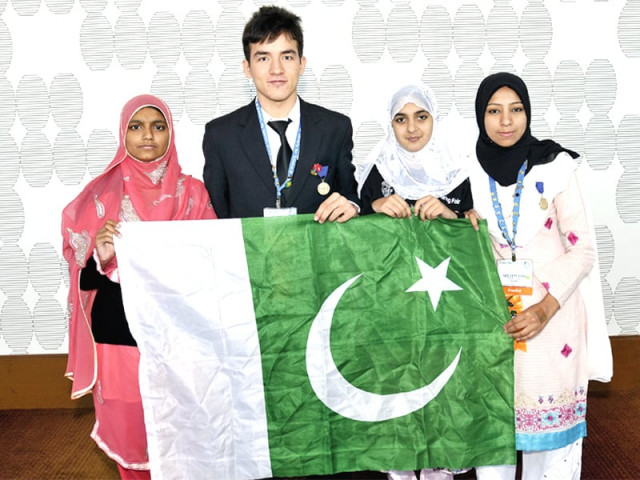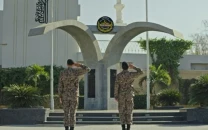ISEF: Off-stage
Young Pakistani scientists share their experiences at the ISEF.

“I understand why terrorists enjoy explosives; they’re a lot of fun. I think it’s really sad that kids aren’t allowed to do chemical experiments in their basements anymore,” said molecular biologist Richard Robert, at a discussion panel of Nobel laureates held as part of the Intel International Science and Engineering Fair (ISEF) 2011, for participating kids to get answers to all their scientific questions.
His statement wasn’t the only controversial one that afternoon as another leading scientist on the panel related an anecdote of when a scientist first made a hot air balloon and was asked what the point of it was and he replied saying: “What’s the purpose of a baby?”
Controversial as it may be, the point is clear: you will never know whether researching a topic will have any usefulness in the real world be it fighting cancer or stopping global warming, until you actually pick an aspect of the world around you that arouses your curiosity and find out everything you can about it. None of the great discoveries of this world, be it gravity or penicillin, would have come without this curiosity. Scientists at the discussion were clearly not in favour of structured or rote learning as kids are often subjected to in school. In fact, Dudley Herschbach, another Nobel laureate was of the opinion that textbooks tell you exactly what you need to know, nothing more nothing less. He insists that all his students write poetry, which is much closer to understanding real science — both require creativity and a fresh look at things that have been around forever in order to develop new ideas.
This is exactly why it was important for kids from Pakistan to be at this convention — three girls and one boy represented Pakistan at the ISEF — where they could interact with great minds and were exposed to what their chaperone described as a life changing experience for them.
This was the first time any of these Pakistani kids were visiting the US, and for two of them, who had entered the competition as a team with their project ‘Degradation of environmental pollutants with nanocomposites’ and who were one of the third prize winners in the environmental science category, this was their first ever trip outside Pakistan.
Meet the kids
It was not just at the panel but also at the grueling judging they had to go through for several hours where they got to meet experts in the fields for which they had entered their projects. But the children seemed to handle it with ease. The next day when I asked them: “How’d it go yesterday?” They said it was fantastic, loads of fun and they absolutely loved the roller coasters and free popcorn and ice cream. I obviously looked confused as I was wondering how the judges managed to turn the exhibition into such a party, when one of them said, “Oh you were talking about the judging? It went well. We were talking about our evening at Universal Studios.”
As it turned out, part of the theme park had been booked for the kids and they clearly had a blast, and the experience overshadowed all knots in stomach that must have resulted before and after the judging. After all participating with 1,543 kids, a precise figure given to me by the girls cannot be an easy task.
Fatima Sohail is only 14 and the youngest of the four winners of the National Science Fair held in Pakistan. Her project was generating electricity with the help of vertical air through a modified yet economical wind mill. Very impressive for her age, especially when you consider that a great effort was made to ensure that all project ideas were completely original. For her the most impressive part of the fair was the precision and ‘discipline’ with which the Americans handled this huge event — the timetables, the schedules, and the punctuality, which she said she learned a lot from.
Ambreen Bibi and Mehwish Ghafoor participated as a team and were third place winners in the Environmental Sciences category. They had an amazing time but they did not like the food. The highlight for them was the opening ceremony, where they exchanged badges with kids of different countries (and gossiped with them as Ambreen pointed out) and competed with each other to see who could get the most badges. They pinned their badges on to their name tags and proudly wore them around their necks for the duration of the competition.
Both Ambreen and Fatima aspire to become doctors while Fatima wants to join the air force.
For 17-year-old Habibullah Mohammed, whose project was an organic battery that created energy from water, it was a delightful moment when people actually liked the Pakistan team. According to his chaperone, he was very fond of shopping.
He even boasted of having collected the most badges at the opening ceremony.
As all these young scientists sat at the breakfast table one morning, the girls, all regular in their daily prayers, jokingly mocked Mohammed for not saying his prayers, while he defended himself saying, “Of course I do,” with a mischievous smile. Isn’t it a breath of fresh air to see these young minds talk about religion without getting emotional or angry and portraying a positive image of Pakistan.
Surely, these kids did Pakistan proud!
Published in The Express Tribune, June 4th, 2011.



















COMMENTS
Comments are moderated and generally will be posted if they are on-topic and not abusive.
For more information, please see our Comments FAQ